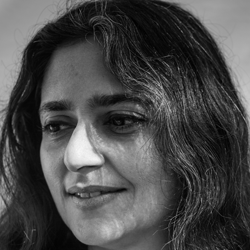 A self-taught animator, spectacular illustrator and thought provoking film maker, Gitanjali Rao graduated from the famous Sir J.J. School of Applied Arts. ‘Printed Rainbow’ – a short film she independently produced, directed and animated in 2006, went on to win three awards at Cannes and also bagged 25 other international laurels.
A self-taught animator, spectacular illustrator and thought provoking film maker, Gitanjali Rao graduated from the famous Sir J.J. School of Applied Arts. ‘Printed Rainbow’ – a short film she independently produced, directed and animated in 2006, went on to win three awards at Cannes and also bagged 25 other international laurels.
He latest film ‘True Love Story’ also premiered in Cannes Critic’s Week 2014; It has been screened at various International Festivals and won three Awards. Besides being the jury member of various prestigious panels and giving enlightening talks, Gitanjali is a fascinating example of how passion can give birth to sublime creations even if it is a one wo(man) show! Gitanjali’s works reflect a surreal and soulful emotion which is not found elsewhere.
AnimationXpress.com got Gitanjali talking about the upcoming Animation Masters Summit organized by Toonz Animation and here is what she had to say…
What is the session that you will be taking at the Master’s Summit and what will you be ideally covering in the session?
The making of my new short film – ‘TrueLoveStory’ – will be the session that I will be taking. I would take the audience through a brief journey of how I make my films; the idea, where it stems from, and the story, how it is worked out over long periods.
I would stress more on research and explorations for visual and sound design and how to connect it to the story; also briefly touching on sound and edit, pacing of the story etc. The talk would end with the screening of my 19 minute film to proceed into an open discussion with the audience.
What are the things that you expect to see at a gathering of such proportions?
A lot of students obviously; young animators from Trivandrum and Kerala, and Kerala being such a cinema literate state, maybe even some film buffs!
How does it feel to be a ‘Master’? What tips or advice would you give young film makers who will be coming down?
The last I remember is coming to ‘The Week with the Masters’ as part of the audience with a film in competition. Way back in 2002 or 2003. It was one of the most enriching weeks of animation for me. The one week to look forward to every year. One met animators like Wendy Tilby, Amanda Forbis, Paul Driessen, sound designers like Normand Roger and others whose works I admired a lot. There were more artists as ‘masters’ than people in the business of animation. They were a huge source of inspiration. So it naturally feels strange to be on the other side now!
However, times have changed now and I know the accessibility to major animators has become much easier. My advice to young film makers remains consistently, to remind them that animation is more hard work than talent. And that story is the spinal cord of a film without which nothing can stand strong or last for long.
What are your views on the current scene in the animation industry in India? How can it be bettered?
The industry is geared towards making money, not cinema. Just like the live action industry. Until this belief changes, very little can be bettered.
What are the skills sets that young artists/film makers/animators must possess to make a mark in this competitive environment?
I wouldn’t know about the competitive environment you talk about because I have not been a part of the industry for very long. For making a film, they need to strengthen storytelling and design through observation, reading, researching and making experimenting ceaselessly. For animation I still believe that drawing skills and learning the principles of motion, through non-virtual mediums is very necessary.
Softwares are no more than a bat or ball in Cricket. Everyone knows how to you use them, but to play and win a game, is what’s most important.
